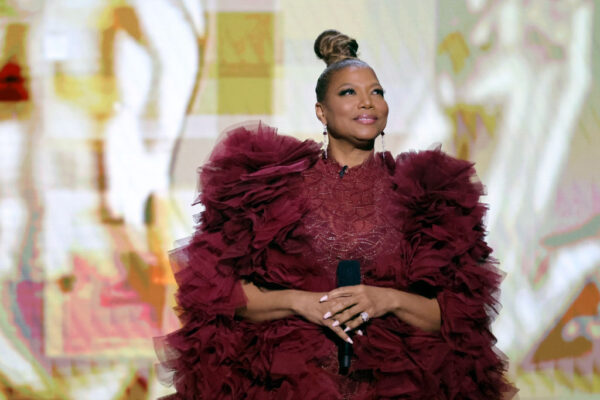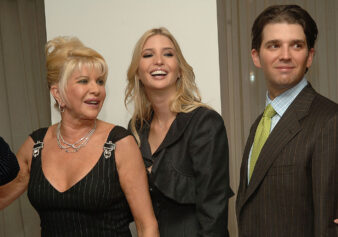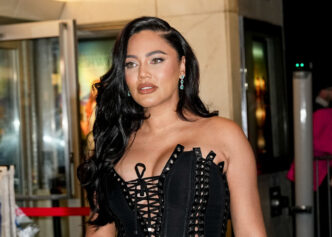When it comes to hip-hop royalty, there is probably no one with a more revered reign than the multi-hyphenate Queen Latifah. One of the first rappers to see herself as a mogul, this Newark girl took her love for the culture, dreams of providing support for others, and gifts to create an empire that presidents respect.

On Jan. 18, 2009, Queen Latifah, whose real name is Dana Elaine Owens, took the marble podium outside of the Lincoln Memorial and delivered a historic reading, referencing Marian Anderson, and supporting the inauguration of the first Black president of the United States of America. She had come a long way from shooting hoops at Irvington High to her $70 million net worth.
Music
The beginning of her journey started at Tommy Boy Records as an emcee. Monica Lynch, the former A&R and then president of the label, said she knew Latifah was going to be star from the first time she met her. That star power and regality secured her a spot on the roster that also included Soul Sonic Force, Stetsasonic, and icons like De La Soul.
Latifah’s music was different for the time. With the rise of gangsta rap, she endeavored to celebrate Black girl magic before it was even a thing.
“Gangsta rap was ruling at the time, and with it came all this misogynistic bull — ‘b-tch’ this, ‘ho’ that. And, crazy as it sounds, I saw female rappers buying into it,” she wrote in her memoir, “Ladies First: Revelations of a Strong.”
Her first two albums, “All Hail the Queen” (1989) and “Nature of a Sista,” (1991) dropped on the label. While both projects released iconic hip-hop hits like “Ladies First,” “Dance for Me,” “Wrath of My Madness,” “Latifah’s Had it Up 2 Here,” neither sold more than 300,000 units.
Then in 1995, she and her partner Shakim Compere founded Flavor Unit Entertainment, leaving Tommy Boy. On their own label, they released “Black Reign,” “Order in the Court,” “The Dana Owens Album,” “Trav’lin Light,” and “Persona,” producing two gold albums.
Latifah’s song “U.N.I.T.Y,” from her third studio album “Black Reign,” reached the highest ranking on the Billboard Hot 100. It spent 20 weeks on the chart between 1993 and 1994, and peaked at no. 23.
Flavor Unit Entertainment
She wasn’t limiting herself to just being an artist; she wanted ownership. She started her own entertainment company.
Flavor Unit Entertainment started as a management and production company. Some of the names that she managed are Monica, Outkast, Faith Evans, Total, SWV, Groove Theory, Monifah, Gina Thompson, LL Cool J, Zhané, Fu-Schnickens, Donell Jones, Apaché, Black Sheep, Channel Live, Nikki D, Naughty By Nature, and more.
Many of the artists under her management went on to be bigger rap stars than she ever was.
Acting
However, Flavor Unit Entertainment was not just a management company. It also was a production company that procured and developed projects for the queen.
Latifah started testing her chops as an actor in Spike Lee’s film “Jungle Fever” in 1991. Robi Reed, the casting director of the film, claims Latifah started the “rapper/actor” phenomenon that is now so common.
“In casting Queen Latifah in the role of Lashawn, we sort of started the rapper-actor casting,” Reed remembers. “She was so popular with her music at that point and no actor had read for that role, but she brought so much to it. She represented being a proud black woman with her music and had an opinion about the Wesley and Annabella interracial relationship, so for us, it made sense.”
Since that gig, the rapper-turned-actor has starred in almost 90 titles including movies, voiceovers (video games and cartoons), and television. Flavor Unit has produced many of the projects she has starred in and some she has thrown her support in back off because she simply believed in them, including “The Equalizer,” “ Just Wright,” “The Perfect Match,” “Bessie,” “The Clark Sisters: First Ladies of Gospel,” “The Rap Game” and a variety of other movies or shows.
Highlights of her career are starring in the Fox sitcom “Living Single” from 1993-1998 and then becoming a successful talk show host of a few variations of her self-titled program (1991-2001 and 2013 to 2014).
Then in 2002, Latifah blew the roof off of Hollywood as Matron “Mama” Morton in the Oscar-winning musical film “Chicago.” She was nominated for Best Supporting Actress for her role during the Academy Awards, becoming one of only two rappers to be nominated for an award from the academy.
CoverGirl
Among her most lucrative ventures is becoming first a model for CoverGirl, then an ambassador, and later a partner.
The popular makeup brand offered her a contract to be a face for the company in 2001.
Five years later, CoverGirl collaborated with Latifah to create an inclusive makeup line for women of color.
The lucrative partnership had been off and on over the years, but in 2022, the two parties inked an exclusive multi-tier partnership that seeks to tap into the market that billionaire Rihanna seems to have locked up.
“Growing up, I didn’t see anyone who looked like me in beauty ads, so I am grateful for this continued partnership with COVERGIRL to inspire the next generation of young black girls who will be raised seeing someone like them as the face of a major beauty brand,” she said.
Other Ventures:
Latifah has worked also as a spokesperson for Pizza Hut and Jenny Craig. When asked about how she has become successful in a male-dominated world, she said it is because she doesn’t see the obstacles. In 2019, she launched The Queen Collective initiative with Procter & Gamble and Tribeca Studios as an effort to empower the next generation of women to make strides in racial and gender equity, according to Forbes.
The Collective is only one of her philanthropic endeavors, mostly centering around teaching young women they are queens and should move accordingly.
“I didn’t even see the damn glass ceiling,” Latifah said in an interview with Parade. “I just pushed up through it. I was the type of girl who fell on my face early. I learned how it felt to get rejected and get back up and dust myself off. I knew what it was to give it your all and find a way to work through it.”
Influencer, entertainer, and entrepreneur, Latifah’s life has shifted the culture making everyone who looks at her hefty portfolio, say, “All hail the queen.”




